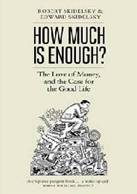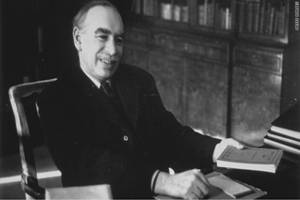Capitalism has intensified insatiability by inflaming status-driven consumption. Economics provides an intellectual barrier to change, because its emphasis is on efficiency at all cost. But the social importance of efficiency, and hence of economics, has declined.
The economist John Maynard Keynes predicted in the first decades of the 20th century that after 100 year of economic growth, scarcity would disappear and we would have to work no more than
3 days a week. Although his forecast of economic growth turned out to be correct, Keynes’ forecast of hours of work did not: since 1930 the average has fallen by only a fifth.
The Skidelskys give several explanations for this: work gives joy; people are put under pressure to work because median income has not risen as much as average income due to increasing inequality; and people always crave to have more than they have.
This characteristic is rooted in human nature and the social character of man, but capitalism has inflamed this innate tendency through advertisements, income inequality, free market ideology hostile to the idea of enough and monetization.
These developments are characterized as a Faustian bargain. Capitalism, for all its success in giving us wealth beyond measure, has taken away the chief benefit of wealth: the consciousness of having enough. The thinkers of the pre-modern world were free from such an illusion.
|
|
Aristotle had a well-defined idea of the good life. Nowadays, the idea of the good life is just a matter of opinion. This leaves us with no more than positional struggle: if there is no mark of what is good, it is best to be ahead. Modern liberal theory and neoclassical economics have a virtual monopoly on public discourse. Ever since John Rawls, liberal thinkers have insisted on public neutrality between rival conceptions of the good. The distinction between needs and wants has disappeared. Economists take people as they are, not as they should be. It is not just any academic discipline, it is the theology of our age. In a world devoted to the satisfaction of private wants, the good life can at best be a marginal concern.
According to the Skidelskys, environmental concerns cannot be the primary reason for limiting economic growth, as it is not self-evident that global warming requires us to abandon growth. The more fundamental reason is a positive one, namely that satiability is necessary for preservation of the good life itself. But if we are to recover an understanding of what it means to have enough, we must relearn to ask the question: what is living well?
The authors propose a list of basic goods that form the good life: health, security, respect, personality, harmony with nature, friendship and leisure (defined as that which we do for its own sake). These goods are plural: lack of one cannot be offset by abundance of another. |
|
The first goal of the individual is to realize the good life for himself. The first duty of the state is to realize, as far as this lies within its power, the good life for all citizens, and it has a legitimate role in creating the material conditions under which these goods can flourish. The authors propose some concrete policies. They prefer a non-coercive paternalism. The fruits of productivity must be shared more equally, and the pressure to consume must be reduced. Possible policy measures are putting a maximum hours of work, and introducing a basic income, a consumption tax, a Tobin tax, restrictions on advertising and limitations to free trade and flows of hot money.
I largely agree with the message of the Skidelskys. Yet, I have quite a number of questions. The first is about work. Although the Skidelskys admit that working may have similar characteristics as leisure, I doubt whether securing the basic goods requires working substantially less hours. While working too much certainly crowds out the good life, a good balance between work, family life or friendship does not require a shorter than standard working week. In this regard, it would have been helpful if the authors had benefited more from Alasdair MacIntyre’s virtue theory, because MacIntyre’s notion of internal goods of practices (and the virtues one needs to develop them) gives ample room to the intrinsic value of working in the context of practices.
The authors therefore would have don better to focus on how to raise the quality of work (rather than to reduce working hours to three days a week) in order to increase the share of leisure-like work. |
|
Furthermore, the Skidelskys seem to ignore that work is not only valuable because of its intrinsic good for the worker, but also because work in many cases provides a service to others. That is why work is sometimes seen as the calling of a person.
Another question is to what extent the Skidelskys think it is possible to reduce positional competition. As they state themselves, it is part of human nature to compare oneself with others. We might change institutions in order not to inflame this kind of competition, but realistically it will not be possible to ban it. The Skidelskys themselves note that it was Herbert Marcuse’s error that he closed his eyes to the obvious fact of original sin, but it seems that they partly fall into the same trap, although they rightly note that moral discipline is important here.
Regarding the basic goods that the Skidelskys propose, a question that pops up is whether we can safely conclude that Western welfare is sufficient to meet them. Some of these goods, such as health, are related to income per capita. Health is a continuous variable that increases with income as more income makes it possible to live a healthier life. Recent cross-country happiness research confirms that happiness increases with income, also in rich countries. Therefore, it is not obvious that preservation of basic goods requires elimination of economic growth. I would argue that it requires selective economic growth that raises the quality of life rather than harming it (J.J. Graafland, The Market, Happiness and Solidarity. A Christian Perspective, London, Routledge, 2010). |




